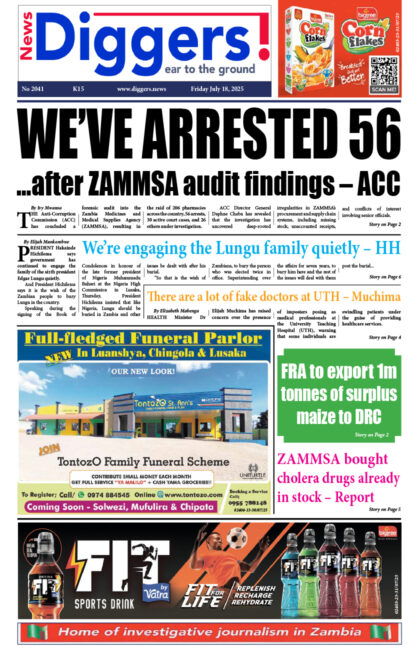ECONOMIST Chibamba Kanyama says the only feasible option to stop Zambia’s debt situation from deteriorating further is for Zambians to come on board and offer support through a “solidarity tax”.
And Kanyama says Eurobond holders will not rush into dragging Zambia to court as they remain committed to an amicable win-win solution.
In an interview, Kanyama observed that Zambia’s debt default had caused anxiety among non-bondholders, adding that Zambians should come together to assist government in solving the problem by way of a solidarity tax, designed to raise funds to deal the country’s sovereign debt.
“There are two positions here: there is the position of the bondholders and there is the implication of what has happened to non-bondholders. The non-bondholders, who have been watching in Zambia and have been investing in Zambia in government securities, the government bonds and Treasury Bills. These will definitely be very anxious! They are anxious and we may see them withholding potential investment in government securities. Now, when you look at the structure of our budget, it’s over 40 per cent dependent on raising money through the bond markets, which means we are looking to both domestic investors, local players, commercial banks, pension funds and we are also looking for external investors, portfolio investors,” Kanyama said.
“These are the ones, who have always been participating in the 90-days, 180-days Treasury Bills and it has been the breathing space of Zambia. Now, given that the deficit levels, deficit for 2020 and anticipated for 2021 are going to be high, we are talking about nine per cent deficit at the moment, it means that we will rely a lot more on debt finance; we rely a lot more on debt finance to finance our budget and when we are defaulting, it means that our capacity to mobilise debt finance is compromised. It means that government has to re-joggle.”
Kanyama urged government to find alternative sources of funding as there would be reluctance by potential portfolio investors to finance the budget following the default.
“It must re-joggle the sources of funding the deficit because my guess is that there will be some level of reluctance by potential portfolio investors, both local and international participants, to come on board to actually finance the budget. We are not financing the debt, but just financing the budget. Government, of course, runs on a budget. Zambia Revenue Authority (ZRA) is affected because of COVID-19 so it’s capacity to mobilise resources is a little bit limited.”
He insisted that Zambians can stop the debt situation from deteriorating further by assisting government through the establishment of a proposed ‘solidarity tax.’
“And when I am saying that government must begin to re-joggle this, I have already made proposals that the only feasible option given what is going to happen is for citizens to come on board through what we call ‘solidarity tax.’ Solidarity tax is a response by citizens to say, ‘can we avoid the situation from deteriorating?’ Let us mobilise money in the short-term to pay off all due arrears on debt. And I am 100 per cent confident that Zambians are well capable if negotiations are done on the backdrop of commitment by government towards fiscal discipline and commitment by government to reduce spending on non-priority areas. Zambians are willing if they can be motivated to do that because we are all aware that the impact can be severe,” he explained.
“It will impact on the exchange rate, it will impact on the credit potential of the country. It will also impact on private debt. This is private debt of Zambian companies that have borrowed from outside. Investors are already concerned because you are operating in an environment where the country has already defaulted on sovereign debt so ‘why must we trust you?’ So, they will begin to price in that risk. So, to avoid all that from happening, we can stop the bleeding now. We can stop the bleeding by putting bandages where the bleeding is taking place. It requires biting the bullet and a national response by all citizens, that ‘let’s stop this from going’ because the repercussions in the long-term will be much more severe than taking the right steps now through the solidarity tax.”
And Kanyama predicted that bondholders, who rejected Zambia’s six-month debt freeze last Friday, will not rush into dragging the country to court as they remained committed to an amicable win-win solution.
“Now, looking at that letter by the bondholders, the bondholders, if you read between the lines, are still committed for an amicable solution. I don’t think, despite the fact that they have appointed a legal firm to look into the issue, I do not think they will rush to court immediately. They still want to engage the Zambian government for an amicable win-win solution. If you read that statement carefully, you will notice that they want to deal with the Zambian government, Ministry of Finance, directly without the involvement of a third-party.”
But he expressed no confidence in government’s debt advisor, Lazard Frere’s capability to negotiate a debt moratorium for Zambia.
“They (Bondholders) do not want to see Lazard in the picture; they want to deal directly with the Zambian government. And I personally buy into that because over time now, I have no confidence in the capability of Lazard to negotiate a debt moratorium for Zambia. The indication, initially, was that they understand this, they have the right experience, but looking at what has happened, I have more confidence in our own people, in our own technocrats in Zambia. I have much more confidence in technocrats, who are outside government, who are capable of appropriately advising government about what to do. If the (Finance) Minister (Dr Bwalya Ng’andu) took time to listen to them and say, ‘how can you people help me?’ If I were to pick between the local advisers and Lazard, I would pick the local advisers,” said Kanyama.
“Even the statements Lazard has been issuing in the name of the Minister, you will realise that they are much more concerned on the legal side of the statement, but leaving the right clarity, leaving clarity to many stakeholders, including the Zambian people. I prefer that the Minister, himself, takes charge; we will support the Minister and I know that at this particular moment, Zambian bond expatriates; Zambian lawyers; Zambian people; Zambian investment experts are all willing to offer solutions, which can take us out of this challenge and we can do it.”



















